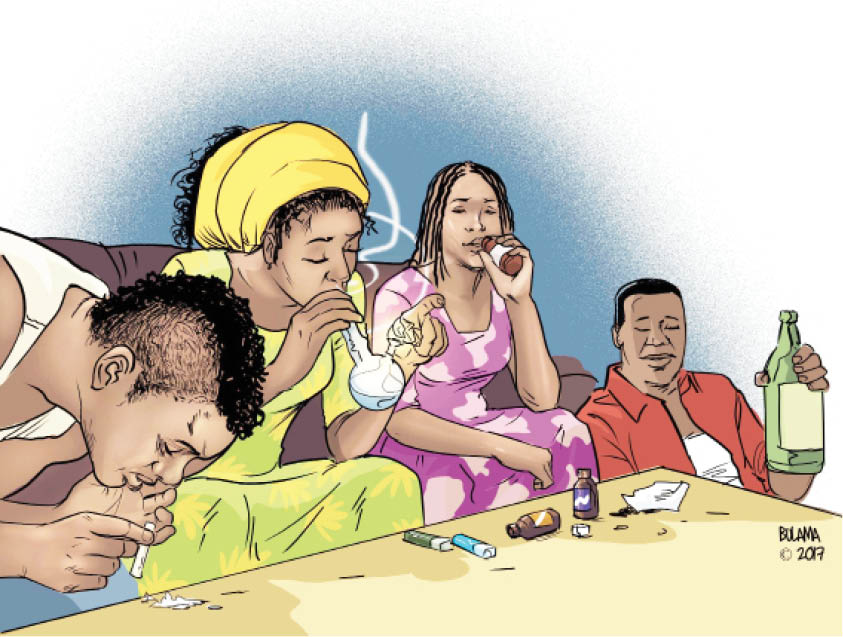Some Muslim youths are engaging in illicit drugs to suppress the impact of fasting during the Ramadan period.
Some of these youths continue to take hard drugs like codeine, heroin and tramadol during Sahoor (pre-dawn meal) to be able to ignore the pangs of hunger during the daytime.
- Malami: Prominent Nigerians financing terrorism will be prosecuted
NPA debacle: Hadiza Bala-Usman faces panel over N165.3bn ‘unremitted’ funds
One of them, a young woman who craved anonymity, told Daily Trust that even in Ramadan she takes codeine and heroin.
“Honestly, I take codeine during my Sahoor. If I don’t take it, I suffer a lot,” she said, adding that she can only endure the hunger that comes with fasting by sleeping through the period, and that is what codeine offers her.
Another person who admitted to having been a drug addict for a long time said that since Ramadan began he did not take any drugs, but he knows a lot of his fellow addicts that are still doing drugs while fasting.
“I am an addict; however, this Ramadan I stopped taking anything to allow me to concentrate fully on the Ibadah,” he said.
He said some of the drug addicts do it at Sahoor to suppress hunger.
“When you take one bottle of codeine you will sleep throughout the day. And once you sleep, you will not think of taking drugs or any other thing,” he said.
He further revealed that some youths break their fast with drugs.
“I know of some people that take drugs during iftar. They break their fast with either Indian hemp or codeine,” he said.
Another person who doesn’t want his name in print said youths would take drugs to reduce the effect of fasting.
“They normally take it after the meal and spend hours sleeping; when they wake up, time would have gone far. So fasting becomes easier for them,” he said.
Dr Auwal Salihu, a consultant psychiatrist at the Aminu Kano Teaching Hospital, said the indiscriminate consumption of drugs was very dangerous.
“Taking drugs is very dangerous to someone’s health. However, the danger depends on the kind of drugs one takes. If a person starts taking drugs from time to time, such as a single one in a day and later, two, before he knows, he will become addicted to it; meaning that he must take it every day,” he said.
He added that consumption of these drugs affects the brain, which means the drug abuser will be doing some things wrongly because he is out of his senses.
“It affects the whole body, not only the brain,” he said.
On youths abusing drugs to escape the impact of fasting, the psychiatrist said such is not healthy as the person stresses his brain by not allowing it to perform its duties.
He added that there is no substance that has the capacity to substitute food, but there are a lot of things that make a person not to think of food or feel hunger.
“You see, these people who take drugs are not putting on weight at all as they don’t eat. They starve themselves,” he added.
He called on the youth to desist from drug abuse for their health’s sake.
“My call to the youth always is to know that these substances they take weaken their immune system and increase the risk of illness and infection. Besides, they lack respect as they are seen as irresponsible people in the society,” he said.
Their action is detestable in Islam – Clerics
Some clerics who spoke on the status of drug addicts during fasting in Islam condemned the action, saying it is detestable (Makruh).
The chairman of the Kano State Council of Ulamas, Sheikh Ibrahim Khaleel said, “We cannot say their fasting is not accepted in Islam. We can only say their act is against Islam teachings because in Islam a person is supposed to fast in his senses. And these people are observing theirs sleeping to suppress their hunger or to avoid being tempted to eat or drink,’’ he said.
Another cleric, Dr Yahaya Tanko also said, “The ibadat (service) is supposed to be done when the person is awake. It cannot be possible for a person to do an act of ibadat while he is sleeping. So their fasting is questionable.”
They should fear Allah – Hisbah commander
On his part, the commander-general of Hisbah Board, Dr Harun Ibn Sina, called on those who take drugs during Ramadan to fear Allah and stop the act, even though the Board cannot trace them.
“We call on these people to fear Allah and stop it. They should remember that the reward for any act of ibadat is doubled, likewise the punishment for evil,” he said.

 Join Daily Trust WhatsApp Community For Quick Access To News and Happenings Around You.
Join Daily Trust WhatsApp Community For Quick Access To News and Happenings Around You.


